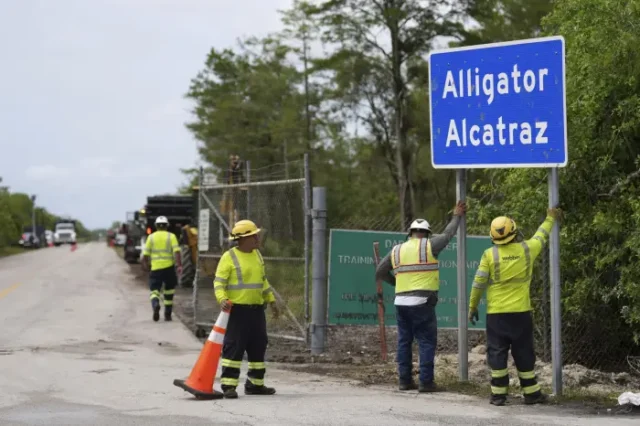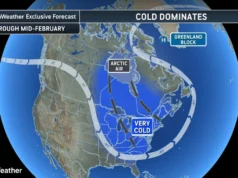
by Jackie Llanos, Florida Phoenix
Miami-Dade County Mayor Daniella Levine Cava wants the state to give the county monitoring authority over the new Everglades immigrant detention center.
The mayor cited in a Tuesday letter to the state’s top legal officer the county’s ownership of the land where the detention center is located as warranting remote video access, weekly reports, and scheduled site visits.
Gov. Ron DeSantis used his authority under a 2023 emergency declaration against illegal immigration to commandeer the Dade-Collier Training and Transition Airport and built the detention center in eight days.
“Given the critical environmental significance of this area and the deep-rooted commitment Miami-Dade has made to properly protecting and preserving our treasured Everglades, it is imperative that local authorities maintain clear transparency in all stages of their handling,” Levine Cava wrote.
Additionally, the mayor voiced deep and growing concern about the safety of people in the custody of U.S. Immigration and Customs Enforcement in a separate Tuesday letter to Kristi Noem, secretary of the U.S. Department of Homeland Security. Five people have died in ICE custody in Florida this year, three at the Krome North Service Processing Center in Miami, according to press releases from ICE.
“Detention centers like Krome and the newly opened facility in the Everglades have been placed in isolated areas with poor access to hospitals and legal counsel,” the mayor wrote.
The county received 32 calls regarding life-threatening conditions from the ICE detention center in Miami in June, Levine Cava wrote to Noem. In June 2024, there were five emergency calls.
Immigrant advocacy group wants legal action
Levine Cava’s letters come as she faces mounting criticism over the county’s response to the detention center, which the state is calling “Alligator Alcatraz,” where detainees started arriving Wednesday.
The Florida Immigrant Coalition paid for two billboards calling for Levine Cava and county officials to sue the state to stop the detention center.
“We feel that the mayor and the county commission are not just failing to protect the rights and wellbeing of the detainees and prospective detainees at the facility, which is obviously the most important thing, but they’re not also protecting the interest of Miami-Dade residents, who theoretically are the owners of this land,” said Thomas Kennedy, a policy analyst for FLIC.

But the county is in defense mode in a lawsuit from environmental groups, asking the U.S. District Court for the Southern District of Florida to halt activity at the detention center. Attorneys for the county responded to the suit from Friends of the Everglades and the Center for Biological Diversity on June 30 by stating that the court couldn’t force the county to take action against the state.
“State law affirmatively requires the County to use best efforts to support the enforcement of federal immigration law, and the County’s failure to comply with that statutory duty could have dramatically adverse consequences for the public interest, including but not limited to the suspension from office of County officials elected by the voters of Miami-Dade County,” the response states.
Who’s allowed to visit?
While members of Congress can conduct oversight visits at federal immigration detention facilities, it’s not clear who will enjoy the same authority over the detention center in the Everglades. The Trump administration recently changed the policy governing Congressional visits to detention centers, requiring 72-hour notice, according to Axios.
Officers guarding the site denied entrance to a group of state Democratic lawmakers Thursday.
“This is a blatant abuse of power and an attempt to conceal human rights violations from the public eye,” wrote Democratic Sens. Carlos Guillermo Smith and Shevrin Jones and Reps. Michele Rayner, Angie Nixon, and Anna Eskamani in a press release Thursday.
A spokesperson for the Florida Division of Emergency Management, which is in charge of the detention center, wrote in an email to Florida Phoenix that the lawmakers were turned away because the center is not under the jurisdiction of the Florida Department of Corrections, and that statute only allows visits for legislative committees.
“Florida Statutes grants inspection authority to a legislative committee, not to individual legislators engaging in political theater,” wrote Stephanie Hartman, FDEM’s deputy director of communications. “This distinction is crucial for ensuring that oversight is conducted through formal, established legislative processes.”
FDEM, DHS, and the attorney general’s office didn’t immediately respond to requests for comment regarding Levine Cava’s letters.
Florida Phoenix is part of States Newsroom, a nonprofit news network supported by grants and a coalition of donors as a 501c(3) public charity. Florida Phoenix maintains editorial independence. Contact Editor Michael Moline for questions: info@floridaphoenix.com.
Disclaimer
The information contained in South Florida Reporter is for general information purposes only.
The South Florida Reporter assumes no responsibility for errors or omissions in the contents of the Service.
In no event shall the South Florida Reporter be liable for any special, direct, indirect, consequential, or incidental damages or any damages whatsoever, whether in an action of contract, negligence or other tort, arising out of or in connection with the use of the Service or the contents of the Service.
The Company reserves the right to make additions, deletions, or modifications to the contents of the Service at any time without prior notice.
The Company does not warrant that the Service is free of viruses or other harmful components












